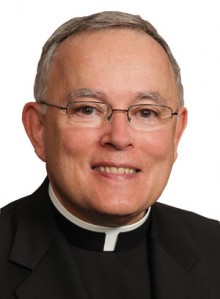Exactly 100 years ago this week, in the first months of the Great War that would begin the bloodiest century in human history, something miraculous happened. All along the Western Front, spontaneous pockets of truce broke out between German and Allied soldiers. The guns would fall silent through Christmas, and in some places, for days afterward. Enemies put down their weapons and openly fraternized, sharing food, drink and stories. Officers finally had to force their men to return to the fighting.
The 1914 Christmas truce, rooted in a common Christian faith and a shared Christian culture of Europe, never happened again. The violence, nationalisms and political extremism of the 20th century wrote the end to that miracle in blood. But for one moment in time, men at war understood their fundamental bond of brotherhood. And they honored it. A century later, it’s worth remembering, if only to capture its peace for our families and for our own hearts.
Christians — in other words, followers of Jesus Christ – celebrate December 25 not as just another secular holiday, but much more deeply as the birthday of the messiah, the guarantor of our humanity; the birthday, in the words of St. Leo the Great, of life itself.
We live in a special time of joy every Christmas season, and it has very little to do with holiday sales. Jesus Christ is Emmanuel – “God with us.” Sharing presents with friends and family is a wonderful tradition that springs naturally from our Christmas happiness. But the noise of mere things should never drown out the quiet voice of God’s love made flesh in the birth of Jesus. Bethlehem, for each of us individually and the world as a whole, is the beginning of something entirely new and utterly beautiful if we ask God for the purity of heart to possess it.
[hotblock]
The world we know today is not so different from the world of the first Christmas.
For Mary, there was nothing sweet about being pregnant and unmarried in the rough countryside of Palestine. She had her faith in God, but whether she had the understanding of her local relatives and friends is a very different matter. Women of her day could be, and sometimes were, stoned for perceived adultery. The accepting love of her cousin Elizabeth would not have been widely shared.
Nor would Mary’s story have been easy for her betrothed. No matter how great his faith, no matter how good his heart, Joseph still probably struggled with very human temptations to doubt. In fact, Eastern Christianity captures Joseph’s confusion powerfully in many of its great icons of the Nativity. The icons often portray Joseph apart from the manger scene, with his back to the mother and child, deep in thought.
Yet, the reality is this: God loved us enough to send us — through the faith of Mary and Joseph — his only Son. He loved us enough to take on our poverty, our indignities and fears, our hopes, joys, sufferings and failures — and to speak to us as one of us. He became man to show men and women how much God loves them. He was born for that purpose. He lived for that purpose. He died and rose again for that purpose.
Jesus is not simply Emmanuel, but also Yeshua, which means “God saves.” When Jesus later preaches in his public ministry that “I am the way, the truth and the life,” he is only restating the miracle that begins in Bethlehem. Our redeemer is born in a stable; he is born to deliver us from sin and restore us to eternal life. This was the meaning of the birth on that first Christmas.
It’s never too late to invite the Christ Child into our hearts. Surely this tired and complicated world never needed a “Christmas truce” more than now. So do we — all of us. May God grant each of us, and those we love, the gift of welcoming Jesus Christ into our hearts this Christmas and throughout the coming year.




Thank You for this. We had a relative who was in the 2nd WW and he mentioned about sharing a cigarette with an American soldier and they both turned and walked away. Love & prayers Paul No war is good.
Disappointed the Archbishop was not elevated. Never mind by 2017, after a minimum tenure of six years as archbishop you should have your red hat from this or a future Pope. (because this Pope is on record that he will not live very long) Patience and perseverance and keep up the excellent work, Archbishop Charles
Did not know about the 1914 Christmas truce during the GREAT WAR but as usual what the Archbishop says is excellent and merits re-reading and reflection.
A Blessed and Holy Christmas to you your Grace and all in your lovely Archdiocese. Good luck your Grace in the future consistory in February where you are expected to be raised to the CARDINALATE. It is very important and symbolic moment for you and the good people of Philadelphia so that when the Pope visits Philadelphia for the Synod on the family later this year he will be met and hosted by a Cardinal.
Absolutely splendid as usual. I compiled some notes of what The Incarnation means in reality before reading this and I am relieved that all the Archbishop’s points are in my notes.